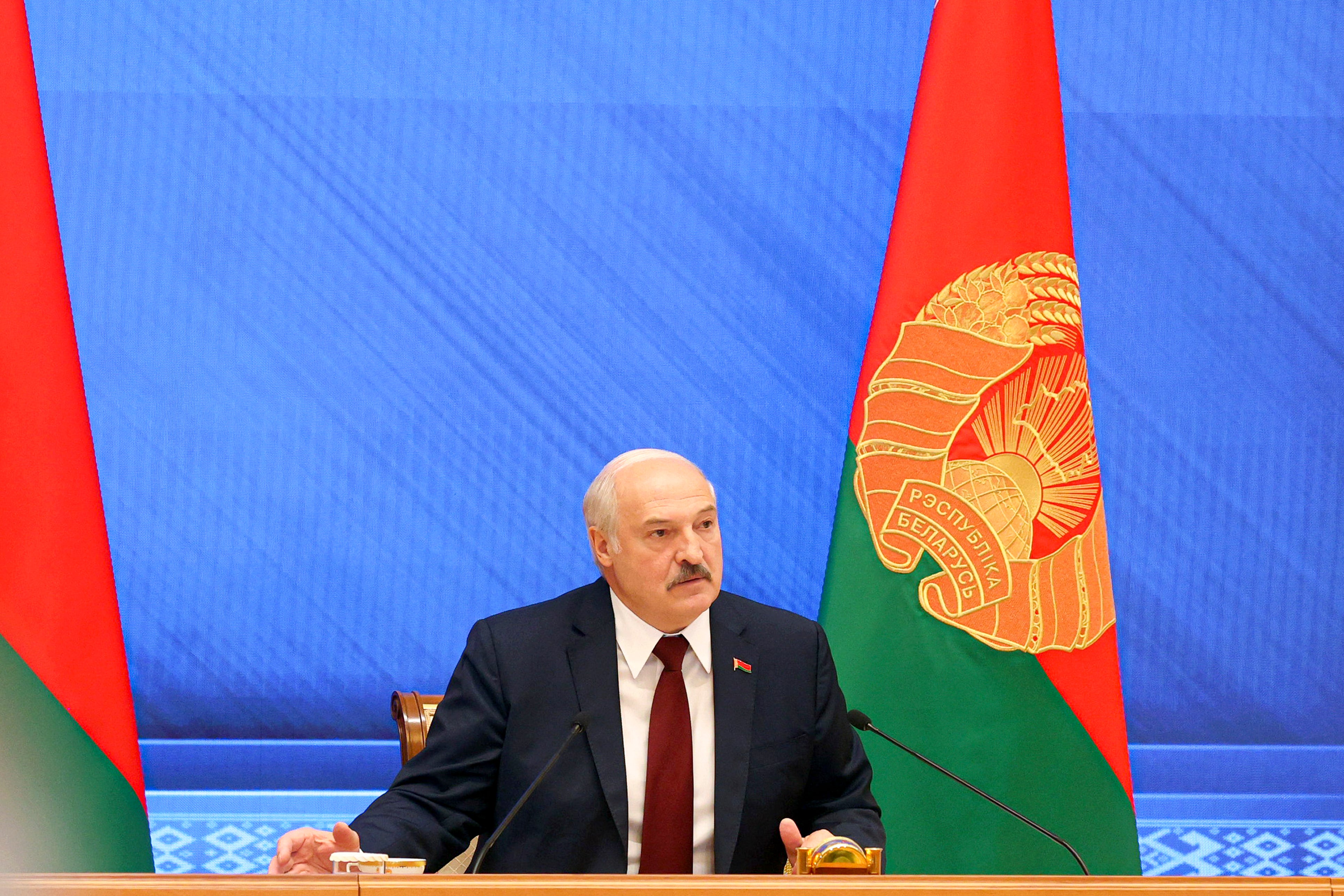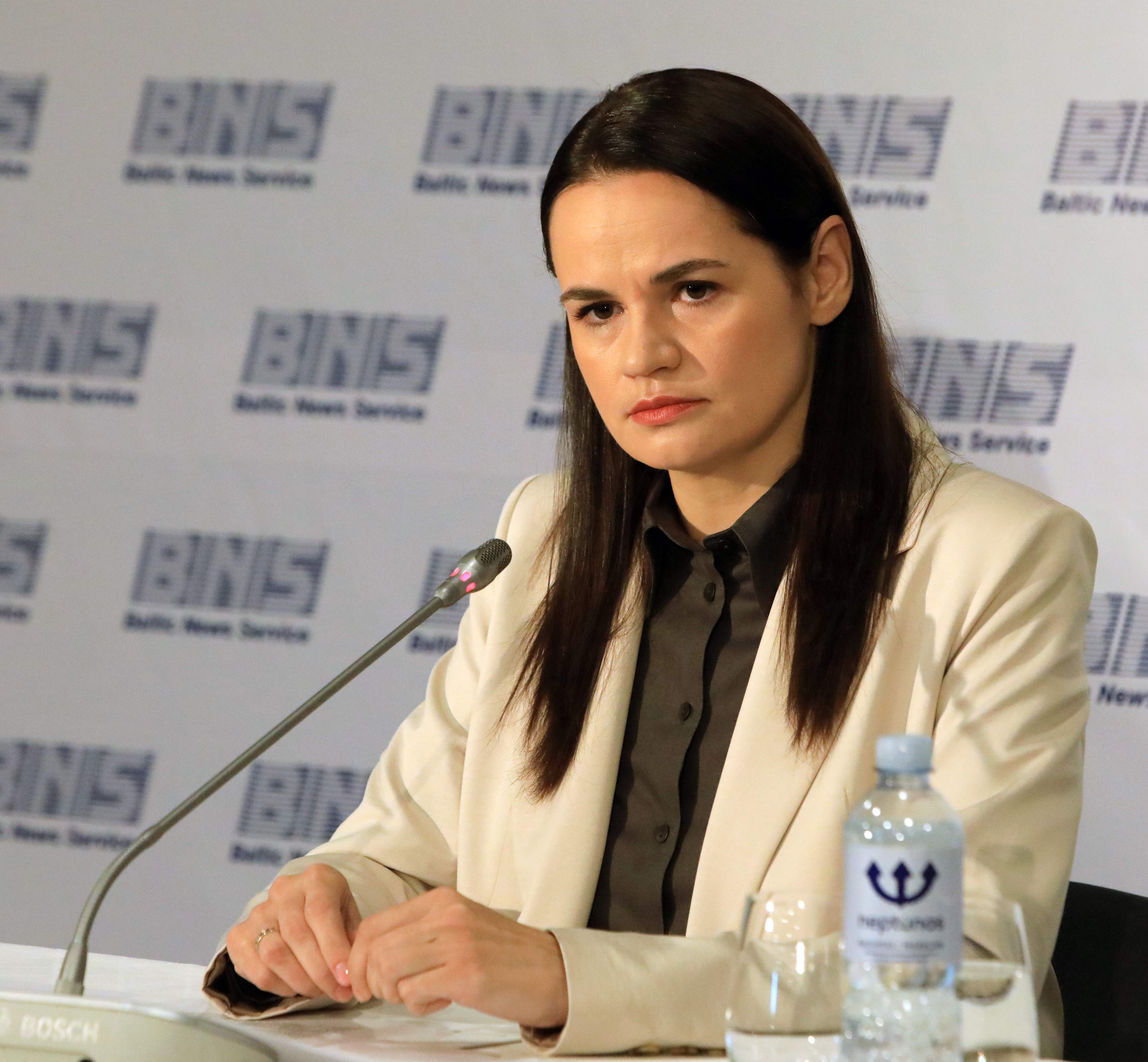‘No quiet life until death’: Alexander Lukashenko opens the door to succession in news conference
The event came on the first anniversary of a disputed election, and as the UK, US and Canada took coordinated action against the regime

A year after declaring victory in a rigged election, Belarusian leader Alexander Lukashenko has lost none of his power to induce wonder.
In comments made during a marathon news conference on Monday, the 27-year-leader delivered what appeared to be a bombshell. He said he was ready to move on – “very soon” – and had identified 15 or 20 possible successors, all of whom resembled him “in some way”.
But in a footnote that may prove closer to the truth, the self-declared president added that he had no intention of becoming “a pensioner”.
“I won’t have a quiet life until my death,” he said.
In the characteristically weird Q&A session – one in which the “A”s took up all but the entirety of the eight-hour conference – Mr Lukashenko denied that he had overseen bloody repression to hang on to power. He was no dictator, he insisted, despite previously identifying as such.
“The world has been overtaken by barefaced lies, hype, hate, bullying, trolling, bots and other communication technologies,” he said.
As he spoke, in an alternative reality, the US, Canada and the UK all moved to impose fresh sanctions on his regime in a coordinated action targeted to hit the country’s economy and its Olympic Committee.
One year ago, on 9 August 2020, Belarusians went to the polls and likely voted in overwhelming numbers for Mr Lukashenko’s unified opponent, Svetlana Tikhanovskaya.
Independent exit polls suggested she had won the votes of more than 71 per cent of Belarusians. The official results reported an inverted reality: that the incumbent had won over 80 per cent against Ms Tikhanovskaya’s 10.
What followed was an increasingly vicious cycle of mass protest and mass repression: thousands arrested, hundreds tortured, and eight people dead.
At one point, protesters looked to be gaining the upper hand, with unprecedented numbers attending demonstrations across the country. That changed in late August, when Russian president Vladimir Putin offered security guarantees.

Emboldened by that autocratic kiss of life, Mr Lukashenko has embarked on an increasingly brazen and repressive trip. He has opened over 4,600 criminal cases against opponents and journalists, with 600 political prisoners remaining in regime jails today. They include presidential rivals who could not, or chose not to, leave the country.
In May, Mr Lukashenko sanctioned the hijacking of a commercial jet carrying opposition journalist Roman Protasevich. Then on 2 August, the exiled Belarusian activist Vitaly Shishov was found hanged in suspicious circumstances in a Kyiv park. Colleagues say he had complained of being followed in previous days.
At various points during Monday’s multi-hour “conversation”, Mr Lukashenko denied having anything to do with any of these excesses.
He rejected evidence that he had ordered the physical torment of hundreds in his jails. That was a manufactured fake, he said. There were only 47 officers at Okrestina, the most infamous of the jails – and that was “not enough” to torture all of the thousands being held.
As far as the case of Mr Shishov was concerned, the deceased man was “a nobody” to him: the president claimed not to know his name. An even weaker defence followed: there was “no way” Belarus would have sent their agents to Kyiv to hang him, he said. He had “enough” people to deal with back home.
“You hang one, and tomorrow there will be someone else – you can’t hang them all,” he said.
The volatile leader devoted many of the early exchanges during the press conference to the country’s worsening relations with Kyiv. Ukrainian president Volodymyr Zelensky has promised a full investigation into Mr Shishov’s death, and on Thursday said he would guarantee the “unconditional defence” of Belarusian activists on Ukrainian soil.
Mr Lukashenko said his opposite number was de facto responsible for the death of a “Belarusian citizen”. That was in contrast to his own model behaviour with the jailed blogger Protasevich, he added – claiming to have saved him from “an assassination plot” being directed from Europe. This was the first time the Belarusian leader had made such claims. He declined to offer proof or details of the supposed foreign operation.
In another topsy-turvy moment, Mr Lukashenko accused Ukraine of sending arms through the largely unprotected forest border between the two former Soviet states. Ukrainian diplomats suggest the opposite is true.
From exile in Lithuania, the woman who likely won last year’s election ran a parallel press conference, saying that Mr Lukashenko’s erratic rule was coming at an increasingly heavy cost to ordinary Belarusians.
“Over one year, his regime has moved from an illegitimate one to a terroristic one,” she said.



Join our commenting forum
Join thought-provoking conversations, follow other Independent readers and see their replies
0Comments